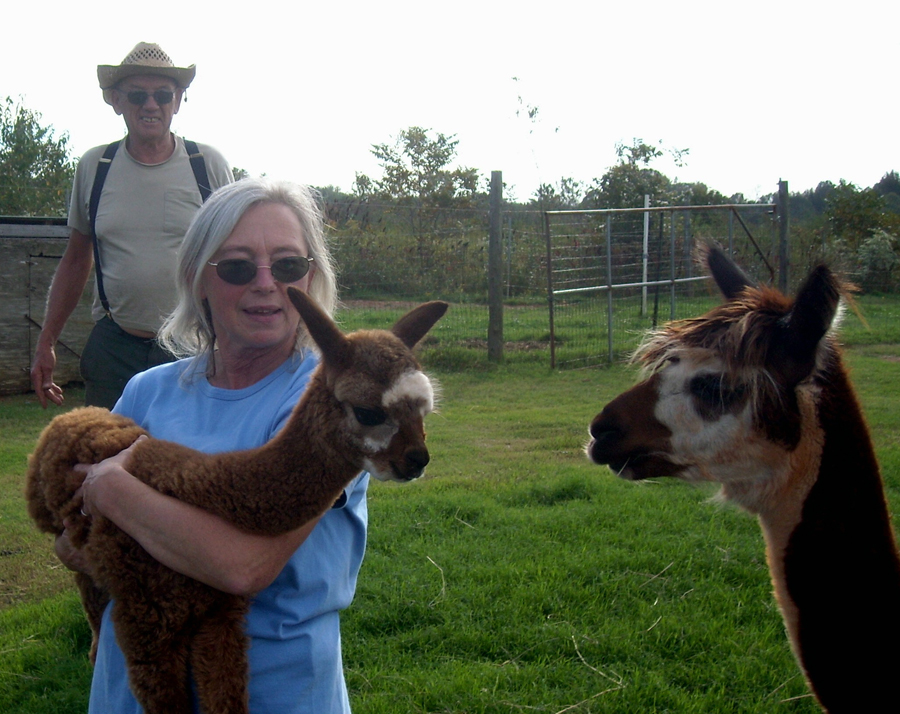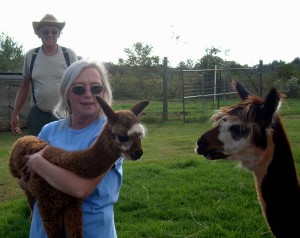by Diana Vossbrinck
Cleopatra. Cinderella. Sokrates. They make interesting family portraits, covering the walls of the back parlor in Joe and Gloria Williams’ home. Joe points to each picture in turn, naming them with a twinkle in his eye, much like any proud papa. Displayed are the alpacas of Lucky Acres Farm, where these beautiful, gentle creatures are indeed a part of the family.
It was never really planned but Gloria Williams is a firm believer that things turn out the way they are supposed to. In 1994, the Williams were living in the Adirondack mountains. Joe was two years away from retirement when the two took a camping vacation to visit friends in South Carolina. They happened upon a newspaper ad for an “old homestead” property for sale, took one look at the 28 acres in Townville, and immediately pulled out a MasterCard to pay a retainer on the farm.
Two days after Joe’s retirement from the state of New York, the Williams pair packed up the camper, originally purchased for Florida getaways, and made it their South Carolina home during the two years it took to build the farmhouse. Joe and Gloria had both been raised on small farms in the Northeast, so they took naturally to gardening and food preserving, returning to the sustainable lifestyle of their childhoods.
The alpacas were another happy advertising accident, some years later. Country Living magazine invited readers to learn more about a “huggable livestock investment” and Joe and Gloria simply couldn’t resist! It took over a year of research and preparations, but in 2002, the Williams mortgaged the property and opened their farm to five alpacas: three pregnant females, one gelding, and one breeding male. The investment is not negligible. The Williams pay $1,000 to $5,000 for a male, and as much as $22,000 for a female. Fortunately, Sweet Pea, Candy, Tabby, Micah Rock, and Majestic Knight continue to thrive and lead a herd now five times its original size.
Alpacas are members of the camel (camelid) family, indigenous to South America, and prized for their luxurious fleece. It is easy to sense the intelligence and gentle dispositions of the animals from the moment one steps onto the pasture. Gloria gathers the newest member of the herd into her arms. “Cody” is only one week old, all chocolate fluff with a slender neck, long delicate legs, and the large warm brown eyes of his mother, who murmurs softly in concern for her newborn.
The gestation period for alpacas is 11 to 11 ½ months, and Joe and Gloria have their females divided into one group birthing in early spring, and another in early fall, so the offspring (cria) can enjoy their first months of life on Lucky Acres in mild weather. The females are immediately bred again, and the cria are weaned after six months so the mother may carry the new pregnancy to term. At weaning, the cria are pastured with the herd’s gelded males, who lovingly take on the care and protection of the youngsters.
Beyond their pleasing nature and the value of their fleece, Joe and Gloria find that alpacas have been an excellent choice for many reasons. Alpacas eat surprisingly little: a handful of hay, two cups of grain, and a small amount of grass consumed at pasture is enough to satisfy a grown animal. Joe fenced in nine pastures, and comments that while granddaughter Lily’s freckled horse and two guard donkeys will clear a pasture in a couple of days, it would take the entire herd of alpacas an entire month to do the same! Small appetites have afforded Joe the opportunity to supplement farm income with hay production, and to his credit, Joe does all of his farming with a 1942 Ford Ferguson tractor he has painstakingly restored and maintained in mint condition.
Unlike some types of livestock production, the Williams have no odor issues to contend with, and truly, no noticeable smell comes from either the animals or their waste. Given access to the outdoors, alpacas will not soil the barn, and the manure collected from the pasture makes excellent fertilizer for both the hayfields and the vegetable garden. Contented chickens stay close to the herd, keeping parasites at bay.
Joe and Gloria tend to routine healthcare of the alpacas themselves, administering scheduled inoculations and carefully monitoring newborns. The Williams are fortunate to have a nearby veterinarian able to treat alpacas, but can only remember having an illness-related call once or twice over the years. Gloria credits the good health of the herd to several factors, including conditions that are not overcrowded, cleanliness, and minimal travel with the animals. Although Joe and Gloria do enjoy the occasional show for the camaraderie and educational opportunity, they admit they are not competitive in nature, and much prefer to enjoy the herd from the comfort of their own back porch.
The affection Joe and Gloria have for their herd makes fleece production an ideal fit for the Williams. Gloria confides that while she respects and appreciates farmers who produce livestock for meat consumption, it is simply not in her to raise an animal for slaughter. It obviously delights her to know that harvesting fleece is actually beneficial to the alpacas, providing them comfort in the hot months of summer.
Sheering is done once a year in April and includes even the newborns. After “skirting,” or cleaning the raw fleece of dirt and hay, the fleece is then sent to a mill for further cleaning, carding, removal of coarse hairs, and finally—spinning into decadently soft yarn. The Williams take advantage of a premium service offered nearby at the Georgia Mountain Fiber mill, and each bundle of finished yarn is returned marked with the name of the individual alpaca who provided the fleece.
Gloria has found that this service has been key to effective marketing of both the yarn and her hand-knit finished work. Each item is pinned with a tag displaying the name and picture of its source animal, creating a unique connection between farm and sweater. It’s a favorite feature to Gloria’s customers, who will find her wares at the farm store, as well as various local fairs and festivals. Although she values and prefers the interaction of a personal transaction, Gloria considers that maybe, maybe she will try internet marketing sometime in the future.
Meanwhile, Gloria looks to the day she can retire from her job as a medical records specialist and join her husband in full time farming. The chores are a labor of love at Lucky Acres Farm, and the couple enjoy doing them together, even though easily managed by one. Joe and Gloria both speak with great affection and appreciation of their land, their home, their herd. They tell the story of a stray dog called Lucky who became the farm’s namesake, and how three weeks to the day their Lucky was buried, a nearly identical Red Tick Hound found its way to their home and hearts. Joe is certain Lucky is looking after them, but one might also guess that through love and hard work, Joe and Gloria have made their own fortune, and that Lucky Acres is, indeed, exactly where they are supposed to be.
Lucky Acres Farm welcomes visitors and groups by appointment, and is happy to share information and advice with other producers or the simply curious. After seven years of careful breeding and production, Lucky Acres livestock is now available to other caring producers.
> Learn more about Lucky Acres Farm at luckyacresfarm.com.



